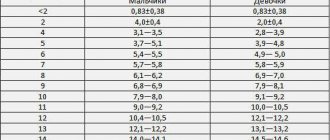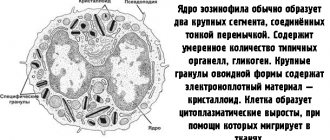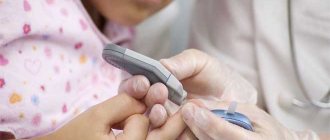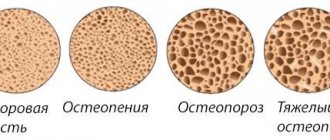A table of TSH norms in men by age has been developed to make it easier to identify hormonal imbalances. Thyrotropin (thyroid-stimulating hormone, TSH) is functionally related to T3 and T4 secreted by the thyroid gland. Thanks to their interaction, many metabolic processes are regulated. Both an increase and a decrease in the amount of thyroid-stimulating hormone in the blood is fraught with serious consequences: disruption of the nervous and digestive systems, sudden jumps in pulse and pressure, weight changes, and decreased sexual function.
A little about the research
The normal level of the pituitary hormone in the body is not a constant value. During life, its concentration in the blood changes. The table will help you navigate the norms of TSH production by the body at different periods of a man’s life.
TSH analysis: normal in men
| Age | The TSH level in the analysis is normal |
| Newborns | 1,1-39 |
| Up to 1st month of life | 1,7-9,1 |
| 1-2.5 months | 0,6-10 |
| 2.5 months - 14 months | 0,4-7 |
| 14 months-5 years | 0,4-6 |
| 5-15 years | 0,4-5 |
| 15-50 years (including before and after 30 years) | 0,4-4 |
| Over 50 years old | 0,5-8,9 |
The level of the active substance produced by the pituitary gland normally has a certain circadian rhythm, that is, it changes in the body during the time of day. The highest level is observed at night, the minimum in the evening. Therefore, it is better to take a blood test in the morning from 8 to 12 o'clock. The level of TSH in the body undergoes fluctuations at different times of the year: in summer, its production in the pituitary gland decreases, and in winter, vice versa, so in doubtful cases it is better to carry out the test not in the summer.
Like any other test, a blood test to determine the production of TSH in the body should be performed on an empty stomach. Food does not affect the pituitary TSH level itself, but it can change the normal functioning of the reagents. Therefore, the rule must be strictly followed. It is also advisable not to smoke and stop drinking alcoholic beverages for a couple of days before the analysis. Before the examination, it is better to skip the gym, as intense training can increase the pituitary TSH level. Also, when analyzing TSH production indicators, you need to indicate to the doctor whether the man took any medications.
Indications for determining the level of a substance produced by the pituitary gland are:
- Retarded development of the child, both mental and physical.
- Depression, mood swings.
- Problems with male potency, infertility, changes in spermogram.
- Decreased libido (sexual desire).
- Fatigue, unmotivated weakness, decreased performance.
- Baldness.
The reason to determine the level of TSH produced by the pituitary gland will be the pathology of the thyroid gland identified during an ultrasound examination. To get a complete picture of what a man’s hormonal background is at the moment, taking a blood test for TSH is not enough. Often, the doctor prescribes a comprehensive examination to monitor which indicators differ from the age norm and make the correct diagnosis. Therefore, at the same time, a man may be recommended to take a blood test for the level of T3, T4-free, thyroid-stimulating hormone of the pituitary gland and antibodies to thyroglobulin, which allows diagnosing autoimmune thyroiditis.
Tables of thyroid hormone indicators
Before taking the tests, you need to follow some rules. For a month you need:
- stop taking hormonal medications;
- stop taking iodine-containing drugs.
A week before the test, the following are excluded from the diet:
- drinks containing alcohol;
- cigarettes;
- physical activity is reduced to a minimum.
Tests are given only in the morning. The optimal time is 8-10 am. You should stop eating 12 hours before donating blood. It is prohibited to overheat or overcool on the eve of handing over the material. The mood should be normal. If these rules are not followed, the results of the analysis of thyroid substances will be distorted.
Let's look at the table of normal substance contents.
| Index | Designation | Norm |
| Thyroid-stimulating hormone | TSN | 0.47-4.15 mIU/l |
| Triiodothyronine bound | TT3 | 1.6-3.01 nmol/l |
| Free triiodothyronine | FT3 | 2.62 nmol/l |
| Thyroxine male bound | TT4 | 60 nmol/l |
| Thyroxine female bound | TT4 | 71.22 nmol/l |
| Free thyroxine | FT4 | 9.55-22.4 nmol/l |
Laboratory analysis reveals substances that are in a free state. They are designated FT3 and FT4. Unlike free substances of the thyroid gland, most of them are in a bound state. They are bound by thyroid binding globulin (TBG). This is a protein substance. In a bound state, they are transported to organs, where they take on a free form. The state of free thyroid hormones is normally the main indicator of its functioning.
Tests are given only in the morning. The optimal time is 8-10 am.
Venous blood is donated for hormone analysis. Excess amounts of hormones cause increased growth of thyroid tissue and oncology.
Statistics show that thyroid cancer is observed in men in 3% of cases. Women get sick more often. Their figure is 5%. After surgery, the thyroglobulin level drops to zero. If the readings remain high, it may mean the cancer has returned. To be sure of the presence or absence of oncology, a test is prescribed to determine the level of calcitonin in the blood of children and adults.
After surgery, the thyroglobulin level drops to zero.
Thyroid substances are affected by a person’s age. Different ages are characterized by their own optimal indicators, which are indicated in the table of thyroid hormone norms.
| Person's age | Normal hormone levels |
| Newborn baby | 1.12 – 16.06 mU/l |
| From 1 month to 1 year | 0.67 – 8.2 mIU/l |
| From 2 to 5 years | 0.48 – 6.50 mU/l |
| From 5 to 12 years | 0.48 – 5.88 mU/l |
| From 12 to 16 years | 0.48 – 5.00 mU/l |
| More than 16 years | 0.47 – 4.14 mIU/l |
Changes in hormone concentrations indicate health problems. A normal amount gives strength and helps a woman maintain health during menopause.
To be sure of the presence or absence of oncology, a test is prescribed to determine the level of calcitonin in the blood of children and adults.
What are the functions of thyrotropin in the male body?
First, let's figure out what it is - thyroid-stimulating hormone in men? Thyrotropin is a hormonal substance produced by pituitary cells and is responsible for the full functioning of the thyroid gland. It, in turn, regulates the functioning of not only the endocrine system, of which it is a part, but also the entire organism.
The production of thyrotropin requires the synthesis of equally important hormones such as triiodothyronine (T3) and tetraiodothyronine (T4). It is by these 3 indicators that endocrinologists can judge the presence or absence of pathologies in the male body.
Why do men need TSH?
What is the TSH hormone responsible for in men, and what main functions does it perform? With the participation of this substance, the following occurs:
- normalization of the heart and blood vessels;
- saturation of body cells with oxygen;
- full functioning of the reproductive organs in men;
- regulation of heat exchange in the body;
- normalization of the functioning of the digestive tract;
- full mental and physical development;
- stimulation of the respiratory system.
A deficiency of the hormone TSH in men can lead to suppression of the functions of the reproductive system, which can result in asthenospermia, or sperm hypoactivity. In addition, a lack of thyrotropin negatively affects the health of the prostate gland, which, if symptoms are ignored for a long time, often leads to serious deviations in its functioning.
Common causes of thyrotropin abnormalities
The level of thyroid-stimulating hormone in men depends on the functioning of the thyroid gland. Any changes in this indicator may indicate even minor disruptions in the functioning of the endocrine gland. The TSH level may also change for other reasons. These include:
- dysfunction of the adrenal glands;
- the appearance of benign or malignant neoplasms in the pituitary gland or hypothalamus;
- inflammatory processes in the thyroid gland;
- poisoning of the body with toxic substances or heavy metals;
- excessive physical activity that is not usual for the body;
- congenital diseases associated with the endocrine system;
- chronic renal failure;
- blood transfusion.
How is the normal level of the TSH hormone in men determined?
Patients often ask what the TSH norm should be in men by age and how to take it correctly.
Indications for collecting biomaterial are:
- Newborn period (if pathology is suspected).
- Treatment of thyroid diseases (to monitor effectiveness).
- Primary detection of thyroid pathologies.
- Tumor, infection or traumatic lesion of the pituitary gland.
Some complaints about deterioration in health are also a reason to get tested.
These include:
- heart rhythm disturbance;
- problems with blood vessels;
- dizziness, headaches;
- hair loss;
- severe fatigue or hyperactivity;
- psycho-emotional disorders (apathy, depression, neuroses, anxiety, aggression);
- intestinal problems (constipation, diarrhea);
- problems with the gallbladder;
- decreased sex drive, problems with conception;
- decreased skin tone, acne;
- swelling of the face and limbs and others.
The concentration of the substance is determined using a blood test, which is performed early in the morning on an empty stomach. After receiving the result, the doctor begins decoding.
To avoid errors it is recommended:
- Avoid medications containing acetylsalicylic acid for 4 days. On the recommendation of an endocrinologist, stop taking hormonal medications.
- On the eve of the study, avoid stress and physical activity. Before the analysis, sit down for 10-15 minutes and relax.
- For 7 days, eat healthy foods - cereals, dairy products, vegetables and fruits.
- Do not drink alcohol 3-7 days before collecting biomaterial. If possible, give up cigarettes.
- Donate blood no earlier than 5 days after X-ray examinations. If the list of diagnostic methods includes an x-ray of the thyroid gland and a test for thyrotropin, then the latter is given first.
If the doctor believes that the TSH on the form from the diagnostic institution is normal, then there is no need to worry. When the result in men does not correspond to the reference values for age, additional examination is required.
Often, deviations in results are due to a laboratory error, so it is advisable to take the test in two medical institutions on the same day with a short time interval.
We recommend reading! Click on the link: How to normalize the level of thyroid-stimulating hormone in the blood with the help of medications and folk remedies
Sources
- https://vse-o-gormonah.com/hormones/tireotropin/norma-u-muzhchin.html
- https://schitovidka.info/bolezni/drugie/nizkiy-ttg.html
- https://endokrinologiya.com/hormones/thyroid/ttg-nizhe-normy-chto-eto-znachit
- https://DiagnozLab.com/analysis/hormones/ttg-nizhe-normy.html
- https://perelomu.net/analizy/ttg-nizhe-normy.html
- https://gormonys.ru/secretion/gipofiz/tireotropnyj-gormon-ponizhen.html
- https://schitovidka.su/lechenie/obshhie/kak-povysit-ttg-337
- https://schitovidka.com/gipotireoz/tireotropnyj-gormon-ponizhen-chto-eto-znachit.html
- https://kakbog.com/bolezni/drugie/nizkij-ttg.html
- https://schitovidka.com/diagnostika/ttg-norma-u-muzhchin.html
Thyroxine for what and how much
The T4 hormone or tetraiodothyronine has another name - thyroxine. A special protein delivers it to all corners of our body. But a small amount of unbound hormone remains, commonly called free T4. This is exactly what it does to the body. Its concentration in the blood shows how well the thyroid gland works.
Interestingly, the production of this hormone depends on the time of day and seasons! The greatest amount of the substance was recorded in the morning hours. It has also been established that in winter and autumn the concentration of this hormone in the blood is high compared to summer and spring. The norm for thyroxine in men is higher than in women.
If the levels of the substance are high, this is usually thyrotoxicosis. If there is a lack of hormone, hypothyroidism is diagnosed
Pay attention to the symptoms. A deficiency of the enzyme is indicated by various symptoms: instability of body weight, dry skin, swelling in the mornings and evenings, and in men, hair loss to the point of complete loss! The causes of thyroxine deficiency include: fasting or exhaustion, lack of iodine in your diet, radioiodine therapy, and endemic goiter.
With an excess of this enzyme, our body also signals: heavy sweating, tachycardia and arrhythmia, hand tremors, fatigue. Excess T4 is caused by: thyroid adenoma, Graves' disease, acute thyroiditis, as well as autoimmune thyroiditis in the initial stage. Free thyroxine in high concentrations in the blood is observed in male patients with obesity or kidney pathology.
Norm T4 free and general:
| Norma T4 | Pmol/l | |
| min | max | |
| Free | 10 | 23 |
| General | 60 | 140 |
Prevention and treatment
Treatment of hormonal imbalances in men directly depends on the causes of the pathology. If you receive a test with TSH abnormalities, you will be prescribed additional diagnostic procedures that will determine the cause of the disease.
It is worth noting that men suffer from abnormalities in the thyroid gland much less frequently than women, but, nevertheless, if the rules of a healthy lifestyle are not followed, the risks of getting sick are quite high.
Prevention of deviations in TSH levels consists of giving up bad habits, hardening, playing sports and eating right. It is worth excluding fatty and fried foods from your diet, limiting the consumption of spicy and salty treats, and giving up sausage and chips. Beer has a strong influence on a man's hormonal levels. His doctors advise him to exclude him from the list of favorite drinks forever.
USEFUL INFORMATION: Spermogram result asthenoteratozoospermia
Men's health and strength largely depend on the patient himself. If you do not pay attention to ailments and fatigue, disruptions in sexual life and poor health, the disease will not go away on its own. The disease will develop and undermine health more and more. The result is weakness and sexual weakness at an early age. If you want to be a real man until old age, consult a doctor in a timely manner and treat all diseases in a timely manner.
How to increase TSH levels by taking medications
How to increase thyroid hormones after low levels have been established? It is necessary to increase the level of thyroid-stimulating thyroid hormones, T3 and T4, respectively, if this leads to an increase in the concentration of TSH in the blood. In fact, only an endocrinologist determines the need for a course of treatment, which is carried out for secondary hypothyroidism.
Drug treatment of low TSH levels is carried out by taking drugs that help stimulate the endocrine function of the pituitary gland, or, conversely, inhibit the production of T3 and T4 by the thyroid gland. Strict instructions have been developed for the use of hormonal drugs.
Table. Drugs that increase TSH levels in the blood:
| Name of medicine | How it works |
| Hormonal drugs | |
| T-reocomb | Increases TSH levels |
| El-thyroxine | Replaces natural T3 and T4 |
| Levothyroxine | Synthetic thyroid-stimulating hormone for replacement therapy |
| Euthyrox | Thyroxine isomer |
| Other drugs that can increase TSH levels | |
| L-dopa | |
| Metergoline | Serotonin antagonist |
| Bromocriptine | Promotes activation of the pituitary gland |
| Heparin | Indirectly increases TSH |
| Glucocorticoids | Increase TSH by suppressing thyroid function |
| Lisuride | Suppresses the synthesis of T3 and T4 |
| Somatostatin | Stimulates growth hormone and TSH production |
| Sulfonamides | Indirectly increase TSH levels |
How to raise TSH with the help of hormonal drugs is decided by an endocrinologist, since such treatment requires a careful, careful approach. If low TSH is associated with dysfunction of the hypothalamus and pituitary gland, then there is no danger to life and the disease is curable
In the event of thyrotoxicosis, due to an increase in the concentration of hormones T3 and T4, intensive therapy is required.
Thyrotoxicosis can cause:
- neurocirculatory dystonia, with symptoms of hypertension;
- dystrophic phenomena in the myocardium;
- attacks of uncontrollable fear;
- frequent mood swings.
In each case of detection of symptoms caused by low TSH levels, treatment tactics and strategies are selected individually.
The following treatment principles are followed:
- a diet is selected in accordance with the individual needs of the body;
- the diet is saturated with iodine-containing products, vitamin complexes and microelements;
- it is necessary to create a calm psychological environment to prevent stress;
- It is advisable to take antidepressants and anti-anxiety medications to stabilize the emotional state.
In order to normalize the level of thyroid-stimulating hormones of the pituitary gland and thyroid gland in the body, folk methods and remedies are widely used in the practice of treating TSH deficiency. When using folk remedies, you need to know whether iodine increases TSH, then the emphasis is on increasing its level in infusions and herbs.
How can you recognize thyroid disease using a blood test for hormones?
When assessing the results, the data must be taken into account comprehensively, since in the presence of any disease several indicators change at once.
If the test results show a deviation from the norm in only one position, this indicates an error in the study and is an indication for retaking the analysis in another laboratory.
Table of diseases and corresponding deviations of hormone levels from the norm:
| Disease | TSH | T3 free form and total | T4 free form and general | Thyroglobulin | Glubolin thyroxine- binding | AT to TPO and AT to TG |
| Diffuse goiter of a toxic nature (thyrotoxicosis) | ||||||
| Asymptomatic, subclinical | Normal values | Increased values | ||||
| Complicated form | Low level | Normal value | High level | Increasing the indicator | ||
| 3 rare | Low level | High level | Normal value | Increasing the indicator | ||
| Glandular tissue adenoma, hyperplasia | Decrease in indicator | Increasing the indicator | Without changes | |||
| Endemic goiter, hypoplasia | A slight increase in the indicator or its normal value | A sharp decline in the indicator | Increasing the indicator | |||
| Hypothyroidism | Increasing value | Decrease in indicator | Increased value | Decrease in indicator | Increased value | |
| Autoimmune thyroiditis | Significant excess of the indicator | At an early stage of development, indicators may be elevated, but when the thyroid gland becomes depleted, there is a sharp and significant decrease in values | Increasing the indicator | An increase in the indicator, while an additional study of antibodies to TSH receptors is prescribed | ||
| Thyroid cancer | A strong increase in the indicator | The value is reduced or normal | Increasing the indicator | Decrease in indicator | No changes observed | |
What to pay attention to
Any endocrinologist will refer the patient to donate blood to determine the amount of thyroid-stimulating hubbub at the slightest hint of a deficiency or excess of thyroid hormones. This analysis allows you to accurately identify the disease and begin timely treatment. Additionally, an ultrasound diagnostic test may also be prescribed (this is done to find out the size of the thyroid gland, the presence of nodes, goiter, and neoplasms).
The most common diseases associated with impaired TSH production are hypo- and hyperthyroidism. Thus, about 30% of the population of our planet suffers from disorders of the thyroid gland, while most diseases can be prevented and cured
Both insufficient and excessive production of hormones are quite serious diseases, so it is important to pay attention to your well-being and not ignore the first symptoms of imbalance in the body
The following symptoms are typical for hypothyroidism:
- Bradycardia (pulse less than 60 beats per minute);
- The appearance of severe swelling;
- Fatigue, drowsiness;
- Frequent headaches;
- Reduced blood pressure;
- Gaining excess weight, even if a person adheres to a normal diet;
- High blood cholesterol levels;
- Frequent nervous breakdowns, depressive mood;
- Problems with memory, thinking, difficulties in perceiving new material;
- Dry and brittle hair, severe hair loss;
- Change in skin color - it becomes jaundiced;
- Menstrual cycle disorders in women.
Congenital hypothyroidism is especially dangerous: critical thyroid hormones are needed in the first days of a baby’s life; if the thyroid gland for one reason or another does not produce the required amount of hormones, the child develops irreversible brain damage. This disease clinically manifests itself in mental retardation. Probably many people know the word “cretin”, but it is perceived in an incorrect and distorted interpretation. Cretinism is a complication of congenital hypothyroidism, when treatment was not started on time, and lost time and lack of timely treatment caused irreparable damage to the baby’s health - his physical and mental development.
As for hyperthyroidism, the main signs of this disease are:
- Increased heart rate (more than 90 beats per minute);
- Heart rhythm disturbances, shortness of breath;
- Sharp weight loss with increased appetite;
- Tremor of the limbs;
- Enlargement of the thyroid gland;
- The appearance of vision problems;
- Increased blood pressure;
- Digestive problems (frequent nausea, causeless vomiting, often bouts of diarrhea);
- Increased excitability, anxiety, the appearance of various phobias;
- Menstrual irregularities;
- Problems with potency in men.
Thus, such symptoms cannot go unnoticed. All of them indicate serious health problems, and are diagnosed quite simply - donating blood from a vein in the morning on an empty stomach. Plasma TSH levels will allow a correct diagnosis to be made with high accuracy. We will talk about how to prepare for blood sampling below.
Decrease in indicators
A decrease in TSH is called hyperthyroidism. This condition is characterized by increased production of the hormones T3 and T4.
If the test shows you have a reduced TSH level, you should pay attention to your lifestyle and psychological state
Often the cause of deviation can be diet or stress.
There are also a number of diseases that cause a decrease in TSH, namely:
- Goiter.
- Plummer's pathology.
- Euthyroid syndrome.
- Pathologies of the pituitary gland.
- Exhaustion of the body.
- Mental disorders.
You can suspect a decrease in the TSH hormone if the following symptoms appear:
- Increased sweating during sleep.
- Extreme sensitivity to increased air temperature.
- Chronic diarrhea.
- Decreased libido and impotence.
- Increased fatigue.
- Increased appetite.
- Sudden weight loss.
- Baldness.
- Irritability and outbursts of anger.
- Sleep problems.
- Arrhythmia, rapid pulse.
Most often, TSH imbalance is the result of an unhealthy lifestyle, and in the absence of serious pathologies, it is enough to change the exercise schedule and adjust the diet so that the level becomes normal again.
Danger of deviations
Most often, men do not consult a doctor in a timely manner. They believe that any deviation will go away on its own if you don’t pay attention to it. However, deviations in TSH levels in one direction or another can significantly reduce the patient’s quality of life. First of all, deviations affect male strength. A decrease in testosterone levels leads to impotence and lack of sexual desire. In this situation, stress and depression inevitably develop. Another problem is the development of osteoporosis. This is a very serious disease that is extremely difficult to treat. Osteoporosis often causes disability.
USEFUL INFORMATION: IVF and future motherhood. How is artificial insemination done?
TSH hormone is below normal
A TSH level below the established norm is accompanied by an increase in thyroid hormones. She becomes hyperactive, and hyperthyroidism is recorded - a very dangerous and uncomfortable condition.
Symptoms
If the level of the TSH hormone is low, then a man has the following symptoms:
significant sweating, especially during sleep; heat is hard to bear; metabolic rate increases and leads to frequent diarrhea; sexual dysfunction; constant fatigue and excessive weakness; uncontrollable appetite; reduction in total body weight; hair loss; the wrists are painful, numbness of the limbs is possible; the heart rhythm is disturbed, the pulse increases; inability to control negative emotions; problems falling asleep and restless sleep; decreased bone density, which threatens fractures; hard to concentrate; causeless irritability and nervousness; tendency to depression.
The man becomes lethargic, his speech becomes slow, and the timbre of his voice decreases. The patient has swollen eyes and a puffy face.
Causes
An imbalance of the hormone in the direction of its decrease can appear as a result of many pathologies. The most common culprits are:
- Toxic diffuse goiter.
- Plummer's disease, or thyrotoxic adenoma.
- Euthyroid pathological syndrome.
- Cachexia (extreme exhaustion of the body).
- Violation of the functions of the pituitary gland and blood circulation in it.
- Long-term use of drugs, the list of side effects of which includes a decrease in TSH levels.
- Stressful situations that provoke significant emotional distress.
- Mental health problems.
Fasting or a strict diet can also cause a decrease in thyrotropin. But such reasons are rare for men. This is inherent in the female sex.
How to prepare for the test
Let's look at how to take a TSH test correctly. To obtain the most reliable result, you need to prepare for this procedure in advance. The essence of preparation is strict adherence to the following rules:
- A few days before collecting the material (at least 3 days), the man must completely avoid drinking alcoholic beverages, even in small quantities. And smoking is also contraindicated. The body should not be subjected to heavy physical, mental or emotional stress. Avoid hypothermia or overheating of the body.
- If possible, completely eliminate the use of any medications if this does not harm your health. In this situation, it is better to consult your doctor. This is especially true for medicines of such groups: hormonal and iodized drugs, as well as complex multivitamins.
- Blood sampling is required on an empty stomach in the morning. After waking up, you should drink only 1 glass of water. Even coffee or tea is not allowed.
- Do not eat food for 12 hours before the test.
Luteinizing hormone in men: functions and norms
If these rules are followed, the man will receive the most informative and reliable test result, which will save him from having to take the test again.
The role and significance of the hormone for the male body
An important hormonal element is produced by pituitary cells. Thyrotropin controls the functional state of the thyroid gland, stimulates metabolism, and prevents deviations in the production of thyroxine and triiodothyronine. TSH secretion reaches its maximum values in the first half of the day, before 11–12 o’clock. The synthesis of thyrotropin is influenced by psycho-emotional balance, the amount of sleep and rest, the quality of nutrition, and the level of immunity.
Hormones T4 and T3 are interconnected with TSH: a sufficient level of regulators ensures the uninterrupted functioning of the central nervous system, cardiovascular, reproductive systems, supports sexual function, bone density and metabolic processes. An increase in T3 and T4 levels reduces the production of thyrotropin.
The value of the thyroid hormone TSH for men:
- stabilizes the functioning of the thyroid gland;
- has a positive effect on metabolic processes;
- is responsible for the process of iodine entering the thyroid cells from blood plasma;
- maintains optimal bone density;
- normalizes potency;
- affects the level of thyrotropin, testosterone, triiodothyronine;
- activates the production of phospholipids, valuable nucleic acids, proteins.
The functions of TSH are so diverse that an increase or decrease in indicators in a short time affects organs and systems. The worse the thyroid gland works, the more actively the synthesis of triiodothyronine and thyrotropin is disrupted, which leads to a greater deviation of TSH values from the norm. Men often complain of impotence, baldness, brittle nails, unmotivated irritability, weakness, diarrhea, obesity or thinness, but do not always understand that the reason lies in hormonal imbalance.
USEFUL INFORMATION: Consequences of egg donation for the female donor
When is testing required?
It is necessary when it is important to check thyroid hormones. The norm for women (table in the photo) is a standard, deviations from which are a cause for concern. Testing is important when:
- symptoms of inhibition or release of hormones;
- upon detection of tumors, diffuse goiter, and the appearance of nodes;
- pregnancy, conception, after the birth of a child;
- after surgery;
- when correcting weight.
What does it mean if TSH is elevated in women?
The thyroid gland produces hormones that are so necessary for our body. Thanks to them, the normal functioning of all organs occurs. Thyroid-stimulating hormone is also directly related to the thyroid gland; it is produced by the pituitary gland of the brain and stimulates the formation of the main hormones T3 and T4, which are responsible for the normal functioning of the cardiac, nervous and digestive systems, and also guide the physical and psychological development of a person. Therefore, if the norm of this hormone is violated, significant disturbances and changes occur that are fraught with serious consequences. Now we will try to find out what it means if TSH is elevated in women.
- Norm of the TSH hormone in women
- What does an elevated TSH level mean in women?
- Treatment
Norm of the TSH hormone in women
As a rule, the TGG norm is different for women and men. You need to know that this indicator may fluctuate depending on age and time of day. Also, in women, this level depends on changes in hormonal levels; it is during pregnancy and menopause that its fluctuations are noted. The norm of thyroid-stimulating hormone in the fairer sex is from 0.4 to 4.0 mU/l. During pregnancy, a reading from 0.2 to 3.5 mU/l is considered normal, since this means that during this period it tends to decrease. An increased rate is fraught with adverse consequences for the development of the fetus. In order to find out whether the TSH hormone is elevated or decreased, you need to contact an endocrinologist who will prescribe certain tests.
Indications for testing for the TSH hormone
The main indications for which this study may be prescribed are:
- Goiter.
- Some forms of hypothyroidism.
- Infertility and menstrual irregularities.
- Problems with muscles and joints.
- Elevated prolactin levels.
- Control examination for diffuse toxic goiter.
- Signs of depression.
In addition, the analysis is prescribed for symptoms of mental and physical abnormalities, decreased sexual desire, changes in body weight with normal appetite, etc.
What does an elevated TSH level mean in women?
Typically, elevated TSH can be observed for some reason, after heavy physical labor or taking certain medications. Also, the cause of an increase in the norm can be severe stress or nervous strain.
Most often these are:
- Inflammatory processes of the thyroid gland.
- Reduced levels of organ hormones.
- Malfunction of the adrenal glands.
- Various types of tumors.
- Nervous and psychological disorders.
Moreover, if the TSH level is elevated, this may also mean that the woman is taking a large amount of iodine-containing drugs. A high level of this hormone also indicates too much psycho-emotional stress; lead poisoning or excessive physical labor may also be the cause. Moreover, the period of pregnancy sometimes causes an excess of the norm, although in overwhelming cases the level of this hormone decreases significantly.
Treatment
If elevated TSH is observed in women, it is necessary to carry out certain treatment with hormonal therapy. As a rule, patients are prescribed the synthetic hormone thyroxine. Treatment begins with small doses, gradually increasing if necessary.
Having learned what elevated TSH means and what symptoms accompany it, if you suspect this condition, you should contact a specialist.
Normal TSH in the analysis
It has been established that the TSH content in the blood of patients of different ages is different. When selecting normal values, the doctor takes into account the patient’s age, as well as the presence and duration of pregnancy. The standard units of measurement are µIU/ml, in which all values will be given below.
The normal value for newborn babies up to 4 months is in the range from 0.7 to 11. The values are similar for full-term and premature babies.
At the age of 4 months to 1 year, the norm is 0.7 - 8.5, then up to 7 years from 0.7 to 6.
Acceptable values for children from 7 to 12 years old are in the range of 0.6 - 5.
Puberty for a teenager is accompanied by significant hormonal changes. Thus, the value of thyrotropin from 12 to 20 years should be in the range from 0.5 to 4.4.
For people over 20 years of age, standard values range from 0.3 to 4.2. After 60 years, there is a slight increase in the concentration of thyrotropin. This is due to a physiological decrease in the amount of T3 and T4.
Normal and deviation after removal of the thyroid gland
After surgical removal of the thyroid gland, the secretion of T3 and T4 stops, and the pituitary gland tries to maximize their content by excessively producing thyrotropin for this purpose. To compensate for the lack of T3 and T4, drugs based on them are prescribed for life.
The normal level of thyrotropin after surgery is from 0.3 to 4.0 mU/ml.
In the first days, the patient has a high level of TSH after removal of the thyroid gland, which is a variant of the physiological norm. However, subsequently its value should return to normal values
It is important to properly prepare for collecting biomaterial, since many medications lead to false-positive results.
Low thyrotropin values after surgery indicate an overdose of hormonal drugs or pathologies in the pituitary-hypothalamic region of the brain.
How to treat thyrotropin deficiency
Thyrotropin deficiency is often associated with poor diet and unhealthy lifestyle. If there is a slight deviation in TSH values, the patient needs to rest for a longer period of time, be less irritated, avoid stressful situations, and balance the diet so that the level of thyrotropin returns to normal.
Vitamins, seafood, vegetables, fresh herbs, poultry, lean fish, nuts must be on the table at any time of the year. Loads of various kinds should not provoke chronic fatigue and damage to musculoskeletal tissue.
In the case of a pronounced decrease in TSH, severe hypofunction of the pituitary gland and thyroid gland, and autoimmune pathologies, the endocrinologist prescribes synthetic analogues to restore hormonal balance. To maintain the therapeutic effect, you need to timely adjust the dose of regulators, periodically take tests, follow nutritional rules, and normalize your lifestyle.
The sooner the factors that provoke a deficiency of this important hormone disappear, the sooner a man will experience normalization of potency. With prolonged overload and persistent hormonal imbalance, the risk of osteoporosis increases, which can lead to disability of the patient.
Effective treatments
With mild to moderate degrees of pathological changes in the tissues of the problematic gland, a positive result of therapy is most often manifested. To restore hormonal balance, the endocrinologist prescribes a complex of medications and diet
It is important to give up bad habits: smoking, alcohol, to reduce the load on organs and systems
When choosing a treatment method for the thyroid gland in men, the specialist takes into account the degree of damage and the nature of the negative process. In case of critical tissue growth or detection of malignant changes, the help of a surgeon and oncologist is needed.
Endemic goiter
Features of treatment:
iodine-containing diet. The right diet allows you to saturate the body with iodine 100-200 mcg per day
If there is a deficiency of an important substance, you must definitely eat flounder, red fish, pollock, squid, shrimp, seaweed, the exotic feijoa fruit, healthy walnuts, iodized salt in moderation, and the drug Iodomarin. The optimal daily dose and duration of taking the pills is determined by the attending physician, the critical size of the thyroid goiter, active tissue proliferation is the reason for prescribing surgery to remove the problem organ
Hypothyroidism
Features of therapy:
In case of hormone deficiency, the endocrinologist prescribes drugs for replacement therapy. The patient must receive synthetic hormones throughout his life, similar to the substances produced by the thyroid gland. Depending on the condition of the body, TSH, T3 and T4 indicators, based on test results, the endocrinologist adjusts the daily dosage; an important element of therapy is proper nutrition.
It is important to reduce the load on the liver and digestive tract, avoid large amounts of fried, smoked, and salty foods. The best option is to replace animal fats with vegetable fats, steam, bake
The less baked goods, sweets, carbonated drinks, canned food, and ready-made sauces in your diet, the more active your metabolism is. If you have extra pounds due to hypothyroidism, your health worsens.
Malignant tumor process
Important points of treatment:
- If a malignant process is confirmed, therapy is carried out under the guidance of an oncologist. To stop the growth of altered cells, doctors prescribe radiation and chemotherapy; in advanced cases, partial or complete resection of the affected organ is performed,
- Radioiodine therapy has a good effect on selectively affecting altered cells. After taking a capsule with iodine, an active reaction begins to destroy cancer cells using high doses of radiation, and healthy tissues are practically not affected. With proper preparation for the procedure and following the recommendations after treatment with radioactive iodine, patients quickly recover, the risk of complications is minimal,
- Be sure to strengthen your immune system, get adequate nutrition, and avoid the influence of carcinogens (food and industrial). It is advisable to change your place of residence if poor ecology is one of the causes of thyroid cancer. The patient is registered at the oncology clinic and undergoes periodic tests to monitor the level of tumor markers. When removing the affected gland, you need to take hormones for optimal regulation of processes in the body.
It is important to know what thyroid pathologies occur in men against the background of negative factors. Sufficient iodine intake, maintaining the health of the nervous system, proper nutrition, preventive examinations are important elements in the prevention of severe endocrine pathologies
What are the first signs to suspect problems with the thyroid gland? What features of the symptoms of thyroid dysfunction in men can be identified? A specialist will answer these and other questions in the following video:
Endocrine system and its hormones
The most important glands in the body are the pituitary gland and the hypothalamus. They are interconnected and participate in the regulation of the entire endocrine system. TSH is a hormone of the pituitary gland and is responsible for the functioning of the thyroid gland.
The thyroid gland is responsible for the functioning of the following organs:
- Respiratory system;
- Regulates the processes of sleep and eating;
- Movement;
- The functioning of the reproductive system;
- Cardiac activity.
This occurs under the influence of thyroid hormones: thyroxine and triiodothyronine. They are involved in metabolism, speed up metabolism, maintain body temperature, and are responsible for growth. Thyroxine is converted into the active stage of the hormone triiodothyronine. It ensures metabolic processes. The hypothalamus also produces the hormone somatostatin.
This hormone acts in the opposite way and reduces TSH production. The hormones thyroxine and triiodothyronine determine how much TSH the pituitary gland can produce. When there are few of these hormones, a lot of TSH is produced, and, conversely, when their concentration is high, the thyrotropin level drops. TSH is produced throughout life, especially during growth and maturation.
Nowadays, there is a special test with which you can find out the TSH content in the blood. The test process involves drawing a small amount of blood into a sterile syringe. Next, a laboratory test is carried out. Doctors especially recommend that men do the test if they suspect they have hyperthyroidism or hypothyroidism.
Determination of TSH
Let's look at TSH, what kind of hormone it is in men. This hormone is produced in the pituitary gland. Its main function is to control the functioning of the endocrine system, and in particular the thyroid gland. Active production of thyroid-stimulating hormone occurs at night and in the morning. By evening, its level decreases.
Let's look at what the TSH hormone is responsible for in men. The body's production of TSH is regulated as needed. That is, at the moment when the concentration of hormones produced by the thyroid gland (T3, T4) decreases, thyrotropin begins to enter the blood. In the same way, the opposite situation occurs when the TSH level decreases.
The role of TSH in the male body is to provide it with other hormones necessary for normal well-being, which are produced by the thyroid gland. If there is an insufficient amount of thyroid-stimulating hormone, this condition negatively affects the speed of metabolic processes, body temperature, phosphorus and calcium levels. This condition weakens the immune system, which can lead to a number of additional diseases.











